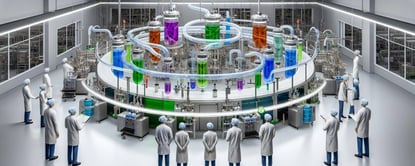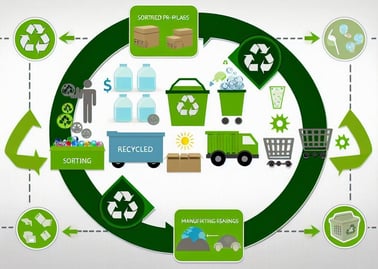Closed-Loop Recycling Systems
The pharmaceutical industry is witnessing a paradigm shift towards eco-friendly practices, with a keen focus on waste reduction and resource optimization. As Purchasing Managers, you are at the forefront of this transformation, tasked with streamlining operations while ensuring environmental stewardship.
One of the most promising avenues for achieving sustainability goals is through the development of closed-loop recycling systems. These systems offer a holistic approach to waste management, enabling the reutilization of materials within the manufacturing process.
In this blog, we'll look into the significance of closed-loop recycling systems in pharmaceutical manufacturing and explore how integration with Enterprise Resource Planning (ERP), Supply Chain Management (SCM), and Manufacturing Execution Systems (MES) can amplify their impact.

Closed-Loop Recycling Systems
Closed-loop recycling systems operate on the principle of circularity, where waste materials are collected, processed, and reintroduced into the production cycle. In pharmaceutical manufacturing, these systems can encompass various elements, including:
- Material Recovery: Efficient collection and segregation of waste materials, such as packaging, solvents, and unused ingredients.
- Processing and Refinement: Advanced techniques, such as purification and sterilization, to transform recovered materials into reusable forms.
- Integration into Manufacturing: Incorporating recycled materials back into the production process without compromising quality or safety standards.

Benefits of Closed-Loop Recycling Systems
Implementing closed-loop recycling systems offers a multitude of benefits for pharmaceutical manufacturers:
- Cost Savings: By reusing materials, companies can reduce procurement costs and minimize expenses associated with waste disposal.
- Environmental Impact: Closed-loop systems help mitigate the environmental footprint of manufacturing operations by diverting waste from landfills and conserving natural resources.
- Regulatory Compliance: With increasing scrutiny on sustainability practices, adherence to waste reduction regulations becomes paramount. Closed-loop recycling systems aid in meeting compliance standards and fostering a positive brand image.
- Resilience and Resource Security: By creating a self-sustaining supply chain, companies become less reliant on external sources, enhancing resilience and ensuring continuity of operations.
Integration with ERP, SCM, and MES
To fully harness the potential of closed-loop recycling systems, integration with ERP, SCM, and MES platforms is essential. Let's explore how this integration can optimize efficiency and streamline processes:
ERP Integration
Seamless integration with ERP systems facilitates real-time visibility into inventory levels, procurement needs, and production schedules.
Procurement managers can accurately forecast demand for recycled materials and adjust purchasing strategies accordingly, minimizing waste and optimizing resource utilization.
Integration with financial modules enables accurate cost tracking and analysis, providing insights into the financial viability of recycling initiatives.
SCM Integration
Integration with SCM platforms enhances supply chain visibility, allowing for better coordination between suppliers, manufacturers, and distributors.
Real-time data exchange facilitates proactive decision-making, enabling quick adjustments to production schedules based on the availability of recycled materials.
Collaborative planning functionalities enable stakeholders to align sustainability objectives across the supply chain, fostering a culture of shared responsibility.
MES Integration
MES integration enables seamless communication between recycling facilities and manufacturing operations, ensuring timely delivery of recycled materials to the production line.
Real-time monitoring of equipment performance and quality metrics ensures that recycled materials meet stringent quality standards, maintaining product integrity.
Integration with production scheduling modules optimizes resource allocation, minimizing downtime and maximizing throughput.

Integration of PlanetTogether with ERP, SCM, and MES Systems
Let's consider a hypothetical scenario where a pharmaceutical manufacturer integrates PlanetTogether, a production planning and scheduling software, with ERP, SCM, and MES systems to optimize closed-loop recycling initiatives:
ERP Integration: PlanetTogether seamlessly integrates with the company's ERP system, allowing for real-time synchronization of production schedules, material requirements, and inventory levels. This integration enables procurement managers to align purchasing decisions with recycling goals, ensuring a steady supply of recycled materials without overstocking or shortages.
SCM Integration: By integrating with SCM platforms, PlanetTogether gains access to comprehensive supply chain data, including supplier capabilities, lead times, and transportation schedules. This enables dynamic production scheduling, where the system automatically adjusts manufacturing plans based on the availability of recycled materials and external supply chain dynamics.
MES Integration: PlanetTogether's integration with MES systems enables granular control over production processes, from material handling to quality assurance. Real-time data exchange ensures that recycled materials are seamlessly incorporated into the production line, with MES systems providing feedback on process efficiency and product quality.
In the pursuit of sustainability and operational excellence, pharmaceutical manufacturers must embrace closed-loop recycling systems as a cornerstone of their waste reduction strategy. By integrating these systems with ERP, SCM, and MES platforms, companies can unlock new levels of efficiency, resilience, and environmental stewardship.
As Purchasing Managers, your role in driving this integration is instrumental, paving the way for a greener, more sustainable future in pharmaceutical manufacturing.
Remember, the journey towards sustainability is not a sprint but a marathon, and every step taken towards waste reduction contributes to a healthier planet and a more prosperous industry. Together, let's embark on this transformative journey towards closed-loop manufacturing and build a legacy of sustainability for generations to come.
Are you ready to take your manufacturing operations to the next level? Contact us today to learn more about how PlanetTogether and integrated scheduling solutions can help you achieve your sustainability goals and drive success in the pharmaceutical industry.


